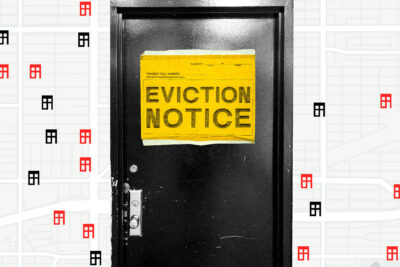ProPublica is a nonprofit newsroom that investigates abuses of power. Sign up to receive our biggest stories as soon as they’re published.
As the coronavirus pandemic continues to ravage the nation’s health and economy, renters and landlords alike are navigating a shifting legal landscape. With unemployment swelling, federal, state and local authorities have scrambled to assemble a makeshift safety net of policies that will keep renters hit hard by the crisis from losing their homes.
These responses offer renters some protections, at least in the short run, but they’ve also created confusion. If you’re a renter, you might have no idea if you can be evicted.
That’s why ProPublica is publishing an interactive database to help renters find out if they may be covered. It lets you search for your address to find out whether you may be protected by a new federal ban on evictions. It also provides information on what state policies are in place to protect renters from losing their homes.
Congress included a federal eviction moratorium in the coronavirus relief bill — known as the CARES Act — passed in late March. The ban expires on July 25, and it only covers renters living in federally backed housing. That’s more than a quarter of all renters, but it still leaves millions more without protection. It also only protects renters from eviction for failing to pay their rent. Landlords can still file for other reasons, such as violating other provisions of the lease.
The federal bill doesn’t include any penalty against landlords with federally backed buildings who file anyway, effectively putting the onus on renters to figure out if they are protected from eviction, though some states have begun requiring landlords to attest that their property isn’t covered by the new law if they file in court. Last month, ProPublica found more than a hundred illegal evictions filed on renters at dozens of buildings across four states. Those likely represent only a fraction of illegal filings nationwide.
If you or someone you know is facing eviction, this tool is just a starting point, and it’s no substitute for legal advice. You should consult with a lawyer, whether you find your building in the app or not. We’ve provided links to resources in your state to help you navigate that process.
If you’re facing eviction, or know someone who is, ProPublica would like to hear from you. Along with the search, we’ve included a link to allow you to tell us about your situation. Your responses will help us report on how the pandemic is affecting housing, and what steps landlords are taking to respond to the economic distress that many renters are facing.
Some details and caveats about the data to keep in mind:
The app is based on data collected from a handful of federal agencies and government-sponsored companies. It takes time to update and release those datasets to the public, so some information may be out of date by the time you use it. Additionally, the app does not display properties with no address information in the source data, those with matured loans or those with loans backed by Fannie Mae or Freddie Mac that haven’t been passed on to investors. Again, whether or not you find your property in the app, we suggest you consult with a lawyer before taking further action.
When it comes to the federal moratorium, our app generally includes apartment complexes with five or more units, and not smaller properties. If you rent a single-family home, or in a home divided into a few units, you may still be covered by the moratorium. But only your landlord can look up whether the individual home loan is backed by Fannie Mae or Freddie Mac — the two government-sponsored agencies that back most single-family mortgages in the U.S. If you don’t live in a large apartment building and you face eviction, we suggest you consult a lawyer to find out what to do next.
Our app builds on the work of the National Low Income Housing Coalition, the Public and Affordable Housing Research Corporation and others to aggregate available data on which properties are covered by the federal ban. It also incorporates information from a team of legal researchers, led by professor Emily Benfer at Columbia Law School, who are tracking state and local eviction policies nationwide.
You can find the underlying data we used here:
For comprehensive data on federally assisted rental housing in the U.S.
For data on multifamily properties with mortgages backed by Fannie Mae
For data on multifamily properties with mortgages backed by Freddie Mac
For data on multifamily properties with mortgages insured by the Federal Housing Administration
You can find additional resources for renters here:
- The National Low Income Housing Coalition has collected the datasets listed above into its own resource
- For detailed information on state and local legislation that affects eviction
For a state-by-state scorecard of eviction protections assembled by Benfer and the Eviction Lab
For state-by-state legal and community resources for renters
Fannie Mae and Freddie Mac have developed their own tools to search whether a property has a mortgage backed by either agency
Filed under:



